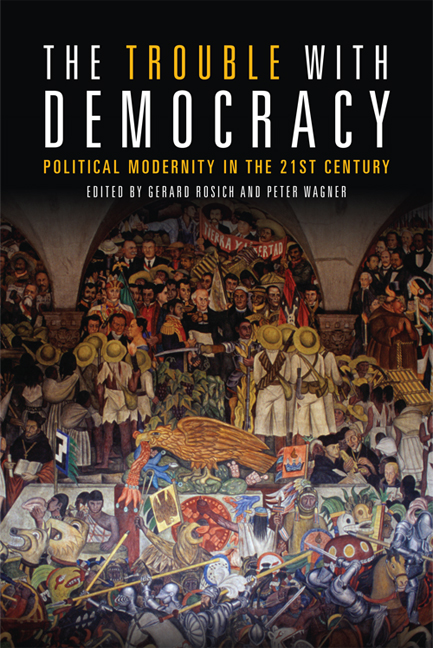Book contents
- Frontmatter
- Contents
- Acknowledgements
- List of Contributors
- 1 Introduction: Re-Interpreting Democracy for Our Time
- 2 Autonomy in and between Polities: Democracy and the Need for Collective Political Selves
- 3 Rethinking ‘Modern’ Democracy: Political Modernity and Constituent Power
- 4 Democratic Surplus and Democracy-in-Failing: On Ancient and Modern Self-Cancellation of Democracy
- 5 Setbacks of Women's Emancipation (Condition, Consequence, Measure and Ruse)
- 6 Political Modernity, Democracy and State–Society Relations in Latin America: A New Socio-Historical Problématique?
- 7 Communitarian Cosmopolitanism: Argentina's Recuperated Factories, Neoliberal Globalisation and Democratic Citizenship. An Arendtian Perspective
- 8 Middle-Classing in Roodepoort: Unexpected Sites of Post-Apartheid ‘Community’
- 9 Democracy and Capitalism in Europe, Brazil and South Africa
- 10 From Realism to Activism: A Critique of Resignation in Political Theory
- 11 The World as We Find It: A Suggestion for a Democratic Theory for Our Times
- 12 Epilogue: Democracy as Capacity for Self-Transformation
- Index
1 - Introduction: Re-Interpreting Democracy for Our Time
Published online by Cambridge University Press: 05 September 2016
- Frontmatter
- Contents
- Acknowledgements
- List of Contributors
- 1 Introduction: Re-Interpreting Democracy for Our Time
- 2 Autonomy in and between Polities: Democracy and the Need for Collective Political Selves
- 3 Rethinking ‘Modern’ Democracy: Political Modernity and Constituent Power
- 4 Democratic Surplus and Democracy-in-Failing: On Ancient and Modern Self-Cancellation of Democracy
- 5 Setbacks of Women's Emancipation (Condition, Consequence, Measure and Ruse)
- 6 Political Modernity, Democracy and State–Society Relations in Latin America: A New Socio-Historical Problématique?
- 7 Communitarian Cosmopolitanism: Argentina's Recuperated Factories, Neoliberal Globalisation and Democratic Citizenship. An Arendtian Perspective
- 8 Middle-Classing in Roodepoort: Unexpected Sites of Post-Apartheid ‘Community’
- 9 Democracy and Capitalism in Europe, Brazil and South Africa
- 10 From Realism to Activism: A Critique of Resignation in Political Theory
- 11 The World as We Find It: A Suggestion for a Democratic Theory for Our Times
- 12 Epilogue: Democracy as Capacity for Self-Transformation
- Index
Summary
We live, supposedly, in the era of freedom and democracy. Never have human rights, many of which are rights to freedom, and democracy been as widely discussed and accepted as key political reference points across the globe as today. Certainly, these commitments are not adhered to everywhere. But recent debate and practice even suggest that external actors have both the right and the responsibility to promote freedom and democracy in regions of the globe where they are not – not yet, as many are inclined to think – fully accepted. This is, so to say, the official view of current politics.
This volume elaborates a very different, much more critical angle on the political condition of the present time. But it also suggests that this official view has to be taken seriously, that it cannot be rejected as merely ideological, as masking domination, as many critics pretend. The official view is based on two key assumptions, one conceptual and the other empirical-historical: that freedom and democracy can attain a coherent, stable form and that this form has been reached in major parts of the world and is about to be achieved in most others, individualisation and democratisation being among the most powerful dynamics of our time. In contrast, this volume maintains that the commitments to freedom and democracy are highly ambiguous and volatile, that they constitute a field of tensions that, in conceptual terms, is devoid of any inclinations towards stability. In historical perspective, furthermore, it suggests that freedom and democracy may have had achieved a temporary, and far from unproblematic, stability in some parts of the world several decades ago, roughly around 1960, but that this stability is long gone and unlikely to return in any similar form.
To characterise the conceptual and empirical agenda of this volume further, we shall start out by capturing some key features of that historical moment: at about 1960, the contemporary description of the political situation in terms of co-existing worlds expressed this sense of relative stability and smooth, gradual change. The ‘First World’, despite the existence of some authoritarian regimes, was modern and had domestically achieved the institutional combination of personal freedom and inclusive democracy.
- Type
- Chapter
- Information
- The Trouble with DemocracyPolitical Modernity in the 21st Century, pp. 1 - 18Publisher: Edinburgh University PressPrint publication year: 2016

